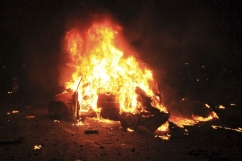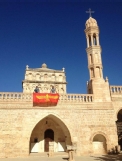Three suicide bombers opened fire then blew themselves up in Istanbul's main international airport on Tuesday, killing 36 people and wounding close to 150 in what Turkey's prime minister said appeared to have been an attack by Islamic State militants.
One attacker opened fire in the departures hall with an automatic rifle, sending passengers diving for cover and trying to flee, before all three blew themselves up in or around the arrivals hall a floor below, witnesses and officials said.
The attack on Europe's third-busiest airport was one of the deadliest in a series of suicide bombings in Turkey, which is part of the US-led coalition against Islamic State and is struggling to contain the spillover from neighbouring Syria's civil war. It is also battling an insurgency by Kurdish militants in its largely Kurdish southeast.
Police fired shots to try to stop two of the attackers just before they reached a security checkpoint at the arrivals hall, but they detonated their explosives, a Turkish official said.
Prime Minister Binali Yildirim said: "This attack, targeting innocent people is a vile, planned terrorist act."
"There is initial evidence that each of the three suicide bombers blew themselves up after opening fire," he told reporters at the airport. Yildirim said the attackers had come to the airport by taxi and that preliminary findings pointed to Islamic State responsibility.
Two US counterterrorism officials familiar with the early stages of investigations said Islamic State was at the top of the list of suspects even though there was no evidence yet.
The officials, who spoke on condition of anonymity, said the use of suicide bombers against "soft" targets was more typical of Islamic State than the other obvious suspect, Kurdish PKK militants who generally attack official government targets.
One of the officials also said that, while Islamic State had recently stepped up attacks in Turkey, the group rarely claims responsibility because Turkey remains one of the main corridors for its fighters traveling from Europe to Syria and Iraq.
No group had claimed responsibility more than nine hours after the attack, which started around 9.50 pm local time (18.50 GMT).
The attack bore similarities to a suicide bombing by Islamic State militants at Brussels airport in March that killed 16 people. A coordinated attack also targeted a rush-hour metro train, killing a further 16 people in the Belgian capital.
"The roof came down"
Most of those killed were Turkish nationals but foreigners were also among the dead, a Turkish official said.
Ali Tekin, who was at the arrivals hall waiting for a guest, said the roof came down after an "extremely loud" explosion. "Inside the airport it is terrible, you can't recognise it, the damage is big," Tekin said.
A woman named Duygu, who was at passport control after arriving from Germany, said she threw herself to the floor after the explosion. "Everyone started running away. Everywhere was covered with blood and body parts. I saw bullet holes on the doors," she said.
Paul Roos, 77, said he saw one of the attackers "randomly shooting" in the departures hall from about 50 metres away. "He was wearing all black. His face was not masked," said Roos, a South African on his way home after a holiday in southern Turkey.
"We ducked behind a counter but I stood up and watched him. Two explosions went off shortly after one another. By that time he had stopped shooting," Roos told Reuters.
"He turned around and started coming towards us. He was holding his gun inside his jacket. He looked around anxiously to see if anyone was going to stop him and then went down the escalator ... We heard some more gunfire and then another explosion, and then it was over."
President Tayyip Erdogan said the attack should serve as a turning point in the global fight against militant groups.
"The attack, which took place during the holy month of Ramadan, shows that terrorism strikes with no regard for faith and values," he said in a statement.
The United States said it stood in solidarity with Turkey, its NATO ally, and that such attacks would only reinforce their joint determination. United Nations Secretary-General Ban Ki-moon stressed the need to intensify global efforts to combat extremism.
Flights resume
Ataturk is Turkey's largest airport and a major transport hub for travelers from around the world. A helicopter buzzed overhead as police evacuated the building. Dozens of passengers walked back down access roads with their luggage, trying to hail cabs.
Authorities initially halted the takeoff of scheduled flights from the airport and some flights to the airport were diverted. Yildirim said later air traffic had resumed.
Turkish Airlines said it had suspended its flights until 8 am (05.00 GMT) today and that any bookings on flights to or from Ataturk airport could be changed or refunded without cost for the next week.
Turkey has suffered a spate of bombings this year, including two suicide attacks in tourist areas of Istanbul blamed on Islamic State, and two car bombings in the capital, Ankara, which were claimed by a Kurdish militant group.
In the most recent attack, a car bomb ripped through a police bus in central Istanbul during the morning rush hour, killing 11 people and wounding 36 near the main tourist district, a major university and the mayor's office.
One person was killed on December 23, 2015, when an explosion hit Istanbul's second airport, Sabiha Gokcen, located on the Asian side of the city. That attack was claimed by a Kurdish militant group.















